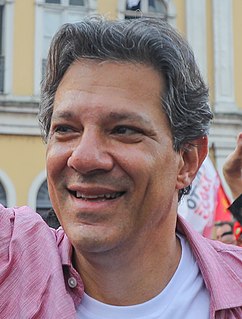Top 28 Quotes & Sayings by Fernando Haddad
Explore popular quotes and sayings by a Brazilian politician Fernando Haddad.
Last updated on December 21, 2024.
Lula's political culture translated into a government project that sought to include the poor in the budget with minimal efforts in terms of structural transformation. The inclusion of the poor would trigger the economy, creating a virtuous cycle of mass consumption market, increased tax collection, more investments, and more benefits.
To be consistent with this discourse of lifting up the military dictatorship in Brazil, the dictatorship that extended from 1964 to 1985, Bolsonaro, his whole life, has been uplifting not only the dictatorship itself but also the methods that the dictatorship used to stay in power, including torture.


















